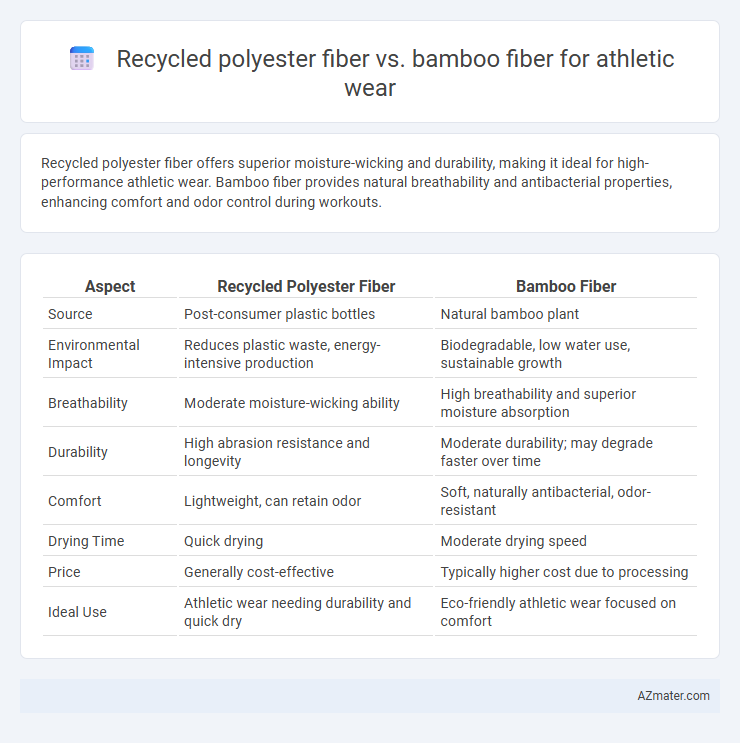Recycled polyester fiber offers superior moisture-wicking and durability, making it ideal for high-performance athletic wear. Bamboo fiber provides natural breathability and antibacterial properties, enhancing comfort and odor control during workouts.
Table of Comparison
| Aspect | Recycled Polyester Fiber | Bamboo Fiber |
|---|---|---|
| Source | Post-consumer plastic bottles | Natural bamboo plant |
| Environmental Impact | Reduces plastic waste, energy-intensive production | Biodegradable, low water use, sustainable growth |
| Breathability | Moderate moisture-wicking ability | High breathability and superior moisture absorption |
| Durability | High abrasion resistance and longevity | Moderate durability; may degrade faster over time |
| Comfort | Lightweight, can retain odor | Soft, naturally antibacterial, odor-resistant |
| Drying Time | Quick drying | Moderate drying speed |
| Price | Generally cost-effective | Typically higher cost due to processing |
| Ideal Use | Athletic wear needing durability and quick dry | Eco-friendly athletic wear focused on comfort |
Introduction to Sustainable Athletic Wear
Recycled polyester fiber offers durability, moisture-wicking properties, and reduces plastic waste by repurposing PET bottles, making it a popular sustainable choice for athletic wear. Bamboo fiber, known for its natural softness, antibacterial qualities, and biodegradability, provides breathable comfort while minimizing environmental impact through rapid renewable resource harvesting. Both fibers present eco-friendly alternatives, with recycled polyester emphasizing waste reduction and bamboo focusing on renewable material sourcing for sustainable athletic apparel.
What is Recycled Polyester Fiber?
Recycled polyester fiber is made from post-consumer plastic bottles and industrial polyester waste, transforming these materials into durable, lightweight, and moisture-wicking fabric ideal for athletic wear. This fiber supports sustainability by reducing plastic waste and lowering the carbon footprint compared to virgin polyester production. Its high elasticity, quick-drying properties, and resistance to shrinking make recycled polyester a popular choice for performance-oriented activewear.
What is Bamboo Fiber?
Bamboo fiber is a natural textile made from the pulp of bamboo plants, known for its softness, breathability, and antibacterial properties, making it ideal for athletic wear. Unlike recycled polyester fiber, which is derived from reclaimed plastic materials, bamboo fiber is biodegradable and more sustainable due to its rapid growth and minimal pesticide requirement. Its moisture-wicking capabilities and natural UV protection enhance comfort and performance in sports apparel.
Environmental Impact: Recycled Polyester vs Bamboo Fiber
Recycled polyester fiber significantly reduces plastic waste and energy consumption compared to virgin polyester, offering a sustainable solution by repurposing PET bottles and textile scraps with lower carbon emissions. Bamboo fiber, derived from fast-growing bamboo plants, boasts natural biodegradability and requires minimal pesticides and water, making it environmentally friendly in cultivation but involves chemical processing that can impact sustainability. When choosing athletic wear materials, recycled polyester excels in circularity and resource efficiency, while bamboo fiber provides renewable sourcing with potential environmental trade-offs in manufacturing.
Moisture-Wicking Properties Compared
Recycled polyester fiber exhibits superior moisture-wicking properties compared to bamboo fiber, efficiently drawing sweat away from the skin to enhance athletic performance and comfort. This synthetic fiber's hydrophobic nature allows quick evaporation of moisture, making it ideal for high-intensity workouts. Bamboo fiber, while naturally breathable and antimicrobial, retains more moisture, which can result in longer drying times during rigorous physical activity.
Breathability and Comfort Analysis
Recycled polyester fiber offers excellent moisture-wicking properties and durability, making it highly effective for athletic wear requiring consistent breathability during intense activities. Bamboo fiber naturally provides superior softness and thermal regulation, enhancing comfort with its antibacterial and hypoallergenic features, ideal for sensitive skin. While recycled polyester excels in quick-drying performance, bamboo fiber outperforms in natural breathability and comfort, offering a sustainable alternative for athletes prioritizing both performance and eco-conscious materials.
Durability and Performance in Sportswear
Recycled polyester fiber offers superior durability and moisture-wicking capabilities, making it ideal for high-intensity athletic wear that requires long-lasting performance under frequent use. Bamboo fiber, while naturally breathable and antibacterial, tends to have lower abrasion resistance and may degrade faster with repeated washing and strenuous activity. For sportswear demanding resilience and consistent performance, recycled polyester is often favored due to its enhanced strength and quick-drying properties.
Cost Efficiency and Availability
Recycled polyester fiber offers significant cost efficiency for athletic wear due to lower production expenses and widespread availability from post-consumer plastic sources. Bamboo fiber, while eco-friendly and naturally antibacterial, generally incurs higher costs linked to processing and limited commercial-scale supply. The abundant global manufacturing infrastructure for recycled polyester ensures consistent availability, making it a more economically viable choice for mass-market activewear brands.
Skin Sensitivity and Allergen Considerations
Recycled polyester fiber offers excellent moisture-wicking properties and durability but may cause irritation or allergic reactions in individuals with sensitive skin due to synthetic chemical residues. Bamboo fiber is naturally hypoallergenic and antimicrobial, making it a superior choice for those prone to skin sensitivities or allergies in athletic wear. Both fibers provide breathability, yet bamboo's smoother texture reduces friction and enhances comfort for sensitive skin during intense physical activities.
Which Fiber Is Best for Athletic Wear?
Recycled polyester fiber offers exceptional moisture-wicking properties, durability, and quick-drying capabilities, making it ideal for high-intensity athletic wear. Bamboo fiber provides natural antibacterial qualities and softness but tends to absorb more moisture, which can lead to discomfort during intense workouts. For optimal performance and sustainability in athletic wear, recycled polyester fiber is generally considered the superior choice.

Infographic: Recycled polyester fiber vs Bamboo fiber for Athletic wear
 azmater.com
azmater.com